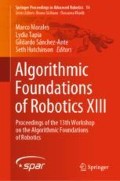Abstract
On-policy imitation learning algorithms such as Dagger evolve a robot control policy by executing it, measuring performance (loss), obtaining corrective feedback from a supervisor, and generating the next policy. As the loss between iterations can vary unpredictably, a fundamental question is under what conditions this process will eventually achieve a converged policy. If one assumes the underlying trajectory distribution is static (stationary), it is possible to prove convergence for Dagger. Cheng and Boots (2018) consider the more realistic model for robotics where the underlying trajectory distribution, which is a function of the policy, is dynamic and show that it is possible to prove convergence when a condition on the rate of change of the trajectory distributions is satisfied. In this paper, we reframe that result using dynamic regret theory from the field of Online Optimization to prove convergence to locally optimal policies for Dagger, Imitation Gradient, and Multiple Imitation Gradient. These results inspire a new algorithm, Adaptive On-Policy Regularization (AOR), that ensures the conditions for convergence. We present simulation results with cart-pole balancing and walker locomotion benchmarks that suggest AOR can significantly decrease dynamic regret and chattering. To our knowledge, this the first application of dynamic regret theory to imitation learning.
Access this chapter
Tax calculation will be finalised at checkout
Purchases are for personal use only
References
Andrew Bagnell, J.: An invitation to imitation. Technical report, Carnegie Mellon University, Robotics Institute, Pittsburgh (2015)
Cheng, C.-A., Boots, B.: Convergence of value aggregation for imitation learning. In: International Conference on Artificial Intelligence and Statistics (2018)
Cheng, C.-A., Yan, X., Theodorou, E., Boots, B.: Accelerating imitation learning with predictive models. arXiv preprint arXiv:1806.04642 (2018)
Cheng, C.-A., Yan, X., Wagener, N., Boots, B.: Fast policy learning through imitation and reinforcement. In: Conference on Uncertainty in Artificial Intelligence (2018)
Hall, E.C., Willett, R.M.: Online convex optimization in dynamic environments. IEEE J. Sel. Top. Signal Process. 9(4), 647–662 (2015)
Hazan, E.: Introduction to online convex optimization. Found. Trends Optim. 2(3–4), 157–325 (2016)
Hazan, E., Seshadhri, C.: Adaptive algorithms for online decision problems. In: Electronic Colloquium on Computational Complexity (ECCC) (2007)
Laskey, M., Chuck, C., Lee, J., Mahler, J., Krishnan, S., Jamieson, K., Dragan, A., Goldberg, K.: Comparing human-centric and robot-centric sampling for robot deep learning from demonstrations. In: IEEE International Conference on Robotics and Automation (ICRA) 2017 (2017)
Mokhtari, A., Shahrampour, S., Jadbabaie, A., Ribeiro, A.: Online optimization in dynamic environments: improved regret rates for strongly convex problems. In: 2016 IEEE 55th Conference on Decision and Control (CDC), pp. 7195–7201. IEEE (2016)
Osa, T., Pajarinen, J., Neumann, G., Andrew Bagnell, J., Abbeel, P., Peters, J., et al.: An algorithmic perspective on imitation learning. Found. Trends Robot. 7(1–2), 1–179 (2018)
Rakhlin, S., Sridharan, K.: Optimization, learning, and games with predictable sequences. In: Advances in Neural Information Processing Systems, pp. 3066–3074 (2013)
Ross, S., Gordon, G.J., Andrew Bagnell, J.: A reduction of imitation learning and structured prediction to no-regret online learning. In: International Conference on Artificial Intelligence and Statistics (2011)
Sun, W., Venkatraman, A., Gordon, G.J., Boots, B., Andrew Bagnell, J.: Deeply aggrevated: differentiable imitation learning for sequential prediction. In: International Conference on Machine Learning (2017)
Yang, T., Zhang, L., Jin, R., Yi, J.: Tracking slowly moving clairvoyant: optimal dynamic regret of online learning with true and noisy gradient. In: International Conference on Machine Learning (2016)
Zhang, L., Yang, T., Yi, J., Rong, J., Zhou, Z.-H.: Improved dynamic regret for non-degenerate functions. In: Advances in Neural Information Processing Systems (2017)
Zinkevich, M.: Online convex programming and generalized infinitesimal gradient ascent. In: Proceedings of the 20th International Conference on Machine Learning (ICML 2003), pp. 928–936 (2003)
Acknowledgments
This research was performed at the AUTOLAB at UC Berkeley in affiliation with the Berkeley AI Research (BAIR) Lab, Berkeley Deep Drive (BDD), the Real-Time Intelligent Secure Execution (RISE) Lab, and the CITRIS “People and Robots” (CPAR) Initiative and by the Scalable Collaborative Human-Robot Learning (SCHooL) Project, NSF National Robotics Initiative Award 1734633. The authors were supported in part by donations from Siemens, Google, Amazon Robotics, Toyota Research Institute, Autodesk, ABB, Samsung, Knapp, Loccioni, Honda, Intel, Comcast, Cisco, and Hewlett-Packard. We thank the WAFR community for their valuable comments and our colleagues, in particular Jeffrey Mahler, Ching-An Cheng, and Brijen Thananjeyan for their insights.
Author information
Authors and Affiliations
Corresponding author
Editor information
Editors and Affiliations
Rights and permissions
Copyright information
© 2020 Springer Nature Switzerland AG
About this paper
Cite this paper
Lee, J.N., Laskey, M., Tanwani, A.K., Aswani, A., Goldberg, K. (2020). A Dynamic Regret Analysis and Adaptive Regularization Algorithm for On-Policy Robot Imitation Learning. In: Morales, M., Tapia, L., Sánchez-Ante, G., Hutchinson, S. (eds) Algorithmic Foundations of Robotics XIII. WAFR 2018. Springer Proceedings in Advanced Robotics, vol 14. Springer, Cham. https://doi.org/10.1007/978-3-030-44051-0_13
Download citation
DOI: https://doi.org/10.1007/978-3-030-44051-0_13
Published:
Publisher Name: Springer, Cham
Print ISBN: 978-3-030-44050-3
Online ISBN: 978-3-030-44051-0
eBook Packages: Intelligent Technologies and RoboticsIntelligent Technologies and Robotics (R0)

